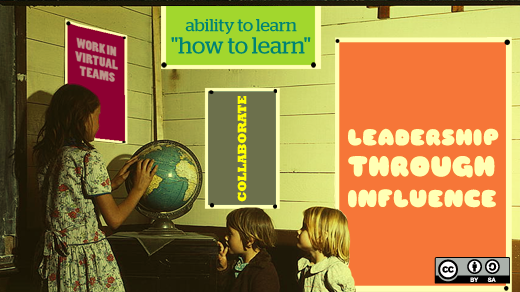Our May 12 #OpenOrgChat brought members of the open organization and open education communities together for a discussion about the future of classrooms.
Below are just a few highlights from our conversation. We hope you'll join us for our next chat—on June 2, the first anniversary of The Open Organization!
Q1: What would happen if we modeled classrooms like #opensource communities? #OpenOrgChat
@openorgbook A: Our open classrooms look more like makerspaces and art studios, and less like factories. #OpenOrgChat
— Charlie Reisinger (@charlie3) May 12, 2016
#openorgchat A1: No kid likes to follow orders so when you make classrooms like open source it makes it more fun and much more interesting!
— Ian Hank (@IanHank2) May 12, 2016
#openorgchat A1: I think if we modeled classrooms more like open source communities if would allow more freedom and creativity for students
— Thomas Hartenstine (@thomaspmhshd) May 12, 2016
@openorgbook A1: students would feel more valued, participants instead of consumers. #OpenOrgChat
— Thomas Cameron (@thomasdcameron) May 12, 2016
A1 So many different ways to approach that question: designing curriculum, choosing lesson formats, structuring the day... #OpenOrgChat
— Sam Knuth (@samfw) May 12, 2016
A1: More intrinsic rewards, recognition for excellence. Students would learn that good work is rewarding, in and of itself. #OpenOrgChat
— Rebecca Fernandez (@ruhbehka) May 12, 2016
All for more movement and less sitting in the classroom #OpenOrgChat
— Heidi Ellis (@HeidiJCEllis) May 12, 2016
A1: This would give room for creativity! Give kids the opp to collaborate and build an experience. Teach them how to adapt. #openorgchat
— Leslie (@patternflygirl) May 12, 2016
Q2: How might we use OpenOrg principles to rethink and retool assessment? #OpenOrgChat
A2: Flexibility in achieving learning objectives. May allow different paths to achieve objectives. #OpenOrgChat
— Heidi Ellis (@HeidiJCEllis) May 12, 2016
@openorgbook A2: Iteration and feedback produce better results that big final tests. #OpenOrgChat
— Charlie Reisinger (@charlie3) May 12, 2016
#openorgchat A2: It would allow for more individual assessment. The student can do something they enjoy and will produce a better end result
— Thomas Hartenstine (@thomaspmhshd) May 12, 2016
A2: Bigger voice for students and teachers in tool selection, tool development... and opportunities to build new tools! #OpenOrgChat
— Rebecca Fernandez (@ruhbehka) May 12, 2016
A2: are we measuring the correct skills? In an OpenOrg peer review is key and #collaboration is a critical skill #openorgchat
— Jeff Mackanic (@mackanic) May 12, 2016
#openorgchat to encourage students to be independant and in control of the outcome and their assessments.
— Gina Kostelich (@ginaartsee10) May 12, 2016
A2. Open Organization principles applied to assessment results in Continuous Evaluation -- an effective approach for education #OpenOrgChat
— E.G.Nadhan (@NadhanEG) May 12, 2016
@openorgbook A2: There would be more ways to take a test then just pen and paper #OpenOrgChat
— Nick B (@Hoss1078) May 12, 2016
How about just plain Joy. When kids design/perform their product of assessment they are over joyed. I C it on their faces. #openorgchat
— rickweinberg (@rickweinberg) May 12, 2016
Q3: How does a student's role shift in a classroom modeled on OpenOrg values? #OpenOrgChat
A3: Students have to own their learning, to be more responsible. #OpenOrgChat
— Heidi Ellis (@HeidiJCEllis) May 12, 2016
@openorgbook A3 I think we'd see a wikipedia-like result, with students engaging and participating at a deeper level. #OpenOrgChat
— Thomas Cameron (@thomasdcameron) May 12, 2016
@openorgbook A3: A student can have more choices in what they want to do. #OpenOrgChat
— Nick B (@Hoss1078) May 12, 2016
A3: Building on other people's ideas, modifying their designs, would no longer be "cheating" but instead, innovation. #OpenOrgChat
— Rebecca Fernandez (@ruhbehka) May 12, 2016
@openorgbook A3. Student-directed, self-assessment, personal responsibility and accountability. #OpenOrgChat
— Frances Ann Squire (@FASquire) May 12, 2016
Q4: What's been the most fascinating part of introducing students to open source? #OpenOrgChat
@openorgbook A4: Watching the light bulb go on when they realize they can make a dent in the world. #OpenOrgChat
— Charlie Reisinger (@charlie3) May 12, 2016
Q4: Watching accomplishment when students understand the range and complexity involved in solving real-world problems. #OpenOrgChat
— Heidi Ellis (@HeidiJCEllis) May 12, 2016
A4: When introducing my 9 year old to @scratch, it's been hearing his ideas for how they could improve it in the next version. #OpenOrgChat
— Rebecca Fernandez (@ruhbehka) May 12, 2016
A4: One of the most interesting things is that i can build my ideas off of others ideas and work collaboratively with them #openorgchat
— Ian Hank (@IanHank2) May 12, 2016
@openorgbook A4: We have actually introduced our fellow students to OS, and it allows a gateway to them learning about OS #OpenOrgChat
— Susan Black (@susanpmhshd) May 12, 2016
@openorgbook A4: A: It also helps demonstrate what can be accomplished by a team of like-minded individuals. #OpenOrgChat
— Charlie Reisinger (@charlie3) May 12, 2016
Q5: What have you found to be the biggest benefit of teaching students open source? #OpenOrgChat
Q5: I've had students invited to a conference in Africa because of FOSS involvement. How cool is that? #OpenOrgChat
— Heidi Ellis (@HeidiJCEllis) May 12, 2016
Students presenting their work to 45 professional GNOME developers. #OpenOrgChat
— Heidi Ellis (@HeidiJCEllis) May 12, 2016
Q6: How might OpenOrg principles help us rethink education standards? #OpenOrgChat
@openorgbook A6 standardized testing today: https://t.co/fERUW4zasx #OpenOrgChat
— Thomas Cameron (@thomasdcameron) May 12, 2016
A6. #OpenData exchange between educational institutions results when applying #OpenOrg principles to education standards #OpenOrgChat
— E.G.Nadhan (@NadhanEG) May 12, 2016
Q7: What do your students seem like most about learning and working the open way? #OpenOrgChat
@openorgbook @susanpmhshd wrote a great article about this! https://t.co/gLxSMjBfrd #openorgchat
— Charlie Reisinger (@charlie3) May 12, 2016
Q7: Interacting with the community. Getting to try new stuff. #OpenOrgChat
— Heidi Ellis (@HeidiJCEllis) May 12, 2016
Q7: And knowing something the prof doesn't is fun! #OpenOrgChat
— Heidi Ellis (@HeidiJCEllis) May 12, 2016
#openorgchat A7: It is much more individualized. We can learn at our own pace and I personally find that to be extremely effective.
— Thomas Hartenstine (@thomaspmhshd) May 12, 2016
How can we scale open source principles to also serve marginalized, rural or struggling schools as well #openorgchat
— JP Sherman (@jpsherman) May 12, 2016
@jpsherman complex problem. Need OpenOrgs to fund people to go into those environments. #openorgchat
— Thomas Cameron (@thomasdcameron) May 12, 2016
Q8: What can educators teach OpenOrg thinkers/practitioners about the future of leadership? #OpenOrgChat
@openorgbook A8: A: Unlocking motivation is powerful. Passion is more important than performance reviews or grades. #OpenOrgChat
— Charlie Reisinger (@charlie3) May 12, 2016
@openorgbook A8 that open orgs drive education/mentorship, those skills are universal in biz and education #OpenOrgChat
— Thomas Cameron (@thomasdcameron) May 12, 2016
A8: Especially in public schools, great educators know how to lead by influence and trust, not by mandate. #OpenOrgChat
— Rebecca Fernandez (@ruhbehka) May 12, 2016
The future of leadership is around involving all. The idea is the gem and the "friction of all" is the jewel. #openorgchat
— rickweinberg (@rickweinberg) May 12, 2016
@openorgbook A8 Ingraining OpenOrg mentality should start young. We learn on the playground: it's better when we play together #OpenOrgChat
— Thomas Cameron (@thomasdcameron) May 12, 2016






Comments are closed.